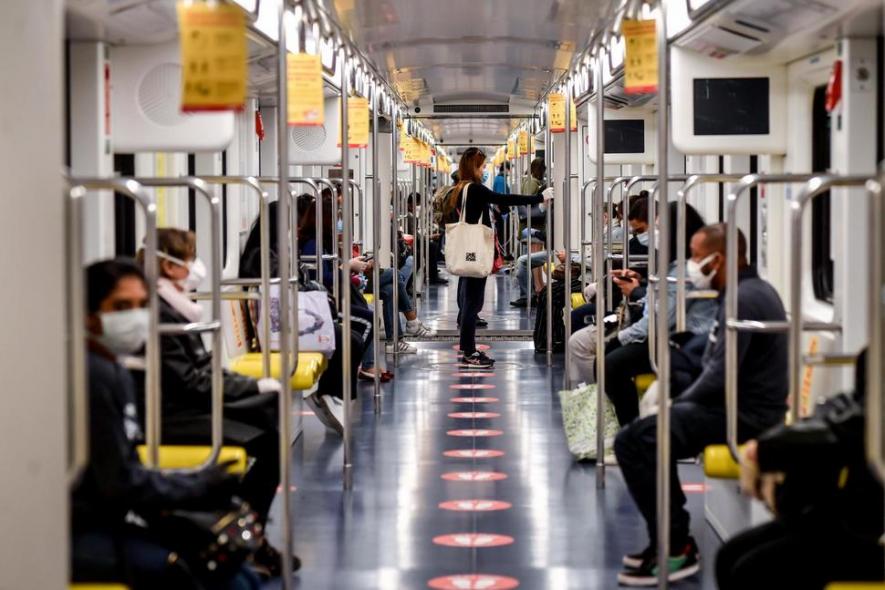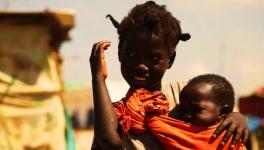COVID-19: Italy Eases Long lockdown, Other Countries Take Patchwork Steps

Image Courtesy: AP
Rome: Millions of people were allowed to return to work in Italy on Monday as Europe's longest lockdown started to ease, while countries from Iceland to India took a patchwork of steps to loosen coronavirus restrictions.
Businesses including hairdressers in Greece and restaurants in Lebanon were opening their doors under new conditions.
With pressure growing in many countries for more measures to restart the economy, politicians also were trying to boost funding for research into a vaccine for COVID-19. There are hopes that one could be available in months, but warnings that it could take much longer.
Italy, the first European country to be hit by the pandemic and a nation with one of the world's highest death tolls, started stirring after its two-month shutdown. In all, 4.4 million Italians were able to return to work, and restrictions on movement eased.
Traffic in downtown Rome picked up, construction sites and manufacturing operations resumed, and flower vendors returned to the Campo dei Fiori market for the first time since March 11.
As infection rates have fallen in large parts of Europe, tentative efforts to restart public life are gathering pace. But Europeans' new-found freedoms are limited as officials are wary of setting off a second wave of infections.
In Italy, mourners were able to attend funerals - but services were limited to 15 people and there was still no word on when Masses would resume. Restaurants scrubbed their floors in preparation for take-out service, but sit-down service is several weeks away.
Belgium allowed some companies to open offices to employees, though remote work is still encouraged. Like Italians, Greeks, Spaniards and many others in Europe, Belgians are being told to wear masks on public transport.
Italians still have to carry certifications explaining why they are out. The list of acceptable reasons has now been expanded to include visits to family and lovers, but just who falls into that category is still unclear.
Greece, which gradually began lifting its seven-week lockdown Monday, dropped a similar requirement for people to send an SMS or carry a self-written permit justifying being outdoors.
Hair salons and some stores such as those selling books and sports goods reopened, albeit with strict hygiene and distancing measures.
People in hard-hit Spain ventured out for the first time for haircuts or food take-outs, but many small shops were still closed as owners worked on meeting strict health and hygiene guidelines.
Neighbouring Portugal also eased its confinement measures and allowed small stores to open.
On Europe's western edge, Iceland also reopened hair salons - along with high schools, dentists and other businesses - after six weeks in which the country has tamed its virus outbreak.
In West Asia, Lebanon is allowing restaurants to open at 30% capacity during the day starting Monday. But many business owners say they won't reopen because they would be losing more money if they operate under such restrictions during a faltering economy, and cafes, clubs and bars have been ordered to stay shut through June.
India allowed some economic activities to resume after a five-week halt, even as the pace of infections has slightly accelerated. The lockdown has achieved a slowdown in the spread of the virus but has caused immense hardship for poor people.
Russia reported a steady rise in the number of infections, an increase that has fuelled concerns the nation's hospitals could be overwhelmed. Authorities say that broader testing has contributed to a surge.
Russia's economy has been partially shut down since late March, and lockdown measures have been extended through May 11.
Governments around the world have reported 3.5 million infections and more than 247,000 deaths, including more than 67,000 dead in the United States, according to a count by Johns Hopkins University.
Deliberately concealed outbreaks, low testing rates and the severe strain the disease has placed on health care systems mean the true scale of the pandemic is undoubtedly much greater.
Developing a vaccine will be the key to returning to less restricted everyday life. On Monday, an alliance of world leaders was holding a virtual summit hoping to drum up around 4 billion euros ($4.37 billion) for vaccine research, some 2 billion euros for treatments and 1.5 billion ($1.64 billion) for testing.
Officials say that amount is just the start.
In a statement, the leaders of France, Germany, Italy, Norway and top European Union officials said that the money raised will be channelled mostly through recognised global health organisations.
The EU's executive Commission had hoped that the United States would take part, but it remained unclear what role, if any, Washington might play in the donor conference.
Germany's health minister said there are “promising” developments but warned that developing vaccines is one of the biggest challenges in medecine.
“I would be glad if we succeeded in a few months, but I think we must remain realistic,” Jens Spahn told ARD television on Sunday. “It can also take years, because of course there can be setbacks - we have seen that with other vaccines.”
Get the latest reports & analysis with people's perspective on Protests, movements & deep analytical videos, discussions of the current affairs in your Telegram app. Subscribe to NewsClick's Telegram channel & get Real-Time updates on stories, as they get published on our website.
























